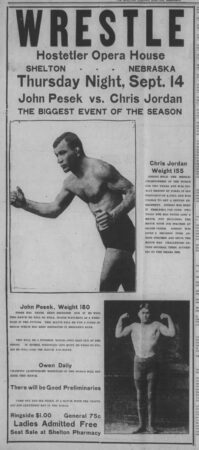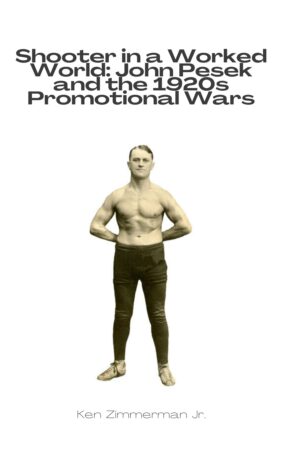Wrestles Gaineamh an Iordáin agus 1916
Bhuaigh John “The Nebraska Tigerman” Pesek dhá cheann de na comórtais dhlisteanacha is cáiliúla sna 1920idí. Chuir Pesek deireadh le dhá chogadh bolscaireachta trí aontú le comórtais a “lámhaigh” le Marin Plestina agus Nat Pendelton.
In 1916, Bhí Pesek ina wrestler nua-aimseartha gníomhach ina stát dúchais Nebraska. Ar Déardaoin, September 14, 1916, Rinne Pesek wrestler eile Nebraska, Chris Jordan. Fans and newspaper reporters recognized Jordan as the former Nebraska middleweight wrestling champion.

Advertisement for the September 14, 1916 match between John Pesek and Chris Jordan (Fearann Poiblí)
While Jordon possessed an experience advantage, Pesek outweighed Jordan by twenty-five pounds. Clarence Ecklund trained Pesek for the ring and taught Pesek catch-as-catch-can wrestling. Pesek developed a particular proficiency with the leg scissors and double-arm wristlock.
Four hundred fans crowded into Shelton, Nebraska’s Hostetler Opera House for the anticipated match. In a common arrangement at the time, organizers placed a mat on the raised stage, so the spectators had an unobstructed view of the wrestling mat.
Pesek took Jordan to the mat to start the match and kept Jordan on the mat playing defense for the next two hours. Pesek almost secured the leg scissors twice, but each time Jordan slipped away from Pesek.
Jordan tried to secure his own arm locks a couple of times. Pesek powered out of every attempt and kept Jordan on the mat looking for an escape. At the end of two hours, the referee tapped both men on the back to end the match.
The referee’s stoppage confused the crowd. The promoters billed the bout as a finish match. Mar sin féin, the referee informed the crowd that if the match continued to the 11 p.m. curfew, the men agreed to call the match a draw.
The fans booed the referee and the wrestlers. Sensing the anger of the crowd, the referee, Pesek and Jordan headed for the dressing room before the fan’s anger led to a riot.
In a few years, Pesek could easily defeat Jordan, but it would not matter as the men transitioned to worked matches. Pesek never liked the worked or prearranged aspect of professional wrestling in the late 1910s and 1920s. Pesek ended up wrestling more legitimate contests than most of his contemporaries.
You can leave a comment or ask a question about this or any post on my Facebook page.
Sources: The Shelton Clipper (Shelton, Nebraska), September 21, 1916, p. 1
Bioráin sé

